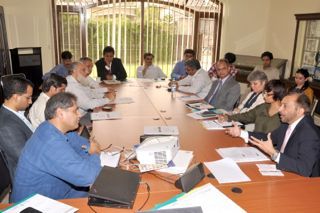The fast approaching general elections in the country enhances the urgency of reforming the electoral laws, agreed politicians, experts and journalists at a Citizens’ Discussion organized by Centre for Civic Education Pakistan (CCEP) on Tuesday.
Titled “Road to Election,” the discussion raised several key questions emanating after a recent Supreme Court verdict on election campaign expanses and regulations and its first implementation in the by-election in NA-151, last month.
The participants were shown a short report “Cracking the Code” that was a compilation of video-documented evidence of violation of election rules in the by-election. Supporters of leading candidates were shown with automatic weapons and hosting party flag in and outside the polling booths. In one case a ballot box carries sticker of a candidate. The candidates also supplied food to the polling staff.
The report pinpointed violations by leading contesting candidates, but underscored that no subsequent action was taken against any of them by the Election Commission of Pakistan.
It was a general consensus after the discussion that mainstream political parties must agree on minimum common agenda of electoral reforms. The participants believed the political parties were the prime actors of bringing about the electoral reforms and that the issue cannot be understood and addressed through court verdicts.
“No system in the world is perfect. The democratic forces should try to develop consensus in bits and pieces if they find it difficult to agree on a whole set of reforms, observed deputy convener of the Muttahida Quami Movement Dr Farooq Sattar.
He demanded immediate formulation and passage of consequential electoral legislation on the basis of 18th Constitution Amendment.
Dr Sattar noted there were certain impractical things in existing electoral code of conduct. He said it was unrealistic for the Election Commission to transport all the voters to the polling booths.
“Electoral legitimacy is under threat which is detrimental for the future of democracy (in Pakistan). We will support the independence of Election Commission. We want it to develop its own paraphernalia to decrease its dependence on the local executive authorities,” he added.
He urge upon the members of civil society to push for electoral and intra-party reforms and impress upon the heads of the political parties to understand and accept their recommendations.
Leader of Awami National Party, MNA Bushra Gohar, said it was fashionable to criticize the political parties. She said generalizing the conduct of the political parties should be avoided.
The ANP leader agreed the existing code of conduct needs to be thoroughly discussed and amended with consensus among the stakeholders.
Senior Journalist Fahad Hussain opined since the political parties were not interested in reforming themselves the Supreme Court had to intervene.
“The plutocracy has developed in Pakistan since the political parties encouraged such trend. The parties which cannot hold elections within their own ranks, how can we expect them to reform the political process,” he questioned.
Aneeq Zafar, columnist and CEO of CRS, observed the electoral reforms should be an ongoing process. “The political parties cannot make reforms over night. Preparing and implementing code is rather easier than transforming the system,” he added.
He proposed the maximum limit of expenditures (Rs 1.5 million) for a National Assembly candidate needs to be increased.
Zafarullah Khan, executive director of the CCEP, gave a detailed presentation to the participants sharing his observations after monitoring NA-151 by-election.
He said the Supreme Court announced its verdict on election campaign expenses and regulations on the petition of Worker’s Party which had never contested the general elections. He added 26 political parties were issued notice to respond before the court on that matter, but only eight submitted their replies.
The CCEP had taken NA-151 by-election as a case study to come up with certain interesting analytical facts. It was noted that compared to 2008 general elections around 12 percent less votes were cast in the by-election.
Zafarullah Khan told the participants that total number of registered voters in NA-151 was 307,871. The candidates were legally allowed to spend a maximum of Rs 1.5 million on the campaign. With this ratio the candidates could not spend more than Rs 4.87 per voter. “An ordinary letter cost Rs 8,” he said giving an interesting context to the entire scenario.
He called for realistic electoral reforms through proper debate and discussion in the Parliament after a meaningful dialogue with all stakeholders. He added the Parliament urgently needs to reform the corresponding legislation in the light of 18th constitutional amendment.
The participants proposed public funding for the political parties, a practice widely appreciated and implemented in the western democracies like Germany.
It was noted the central offices of the political parties in India were located on Akbar Road (New Delhi) and the government charges a token monthly rent of Rs 1 to encourage the healthy political activities.
The representatives of National Democratic Institution, DRI, IFES and members of the civil society took part in the discussion. –Ends

